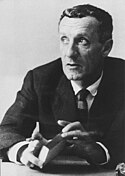Maurice Merleau-Ponty Quote
It is no more natural and no less conventional to shout in anger or to kiss in love than to call a table 'a table'. Feelings and passional conduct are invented like words. Even those which like paternity seem to be part and parcel of the human make-up are in reality institutions. It is impossible to superimpose on man a lower layer of behavior which one chooses to call 'natural' followed by a manufactured cultural or spiritual world. Everything is both manufactured and natural in man as it were in the sense that there is not a word, not a form of behavior which does not owe something to purely biological being and which at the same time does not elude the simplicity of animal life and cause forms of vital behavior to deviate from their pre-ordained direction through a sort of leakage and through a genius for ambiguity which might serve to define man.
It is no more natural and no less conventional to shout in anger or to kiss in love than to call a table 'a table'. Feelings and passional conduct are invented like words. Even those which like paternity seem to be part and parcel of the human make-up are in reality institutions. It is impossible to superimpose on man a lower layer of behavior which one chooses to call 'natural' followed by a manufactured cultural or spiritual world. Everything is both manufactured and natural in man as it were in the sense that there is not a word, not a form of behavior which does not owe something to purely biological being and which at the same time does not elude the simplicity of animal life and cause forms of vital behavior to deviate from their pre-ordained direction through a sort of leakage and through a genius for ambiguity which might serve to define man.
Related Quotes
About Maurice Merleau-Ponty
At the core of Merleau-Ponty's philosophy is a sustained argument for the foundational role that perception plays in the human experience of the world. Merleau-Ponty understands perception to be an ongoing dialogue between one's lived body and the world which it perceives, in which perceivers passively and actively strive to express the perceived world in concert with others. He was the only major phenomenologist of the first half of the twentieth century to engage extensively with the sciences. It is through this engagement that his writings became influential in the project of naturalizing phenomenology, in which phenomenologists use the results of psychology and cognitive science.
Merleau-Ponty emphasized the body as the primary site of knowing the world, a corrective to the long philosophical tradition of placing consciousness as the source of knowledge, and maintained that the perceiving body and its perceived world could not be disentangled from each other. The articulation of the primacy of embodiment (corporéité) led him away from phenomenology towards what he was to call "indirect ontology" or the ontology of "the flesh of the world" (la chair du monde), seen in his final and incomplete work, The Visible and Invisible, and his last published essay, "Eye and Mind".
Merleau-Ponty engaged with Marxism throughout his career. His 1947 book, Humanism and Terror, has been widely understood as defense of the Soviet farce trials. Slavoj Zizek opines that it avoids the definitive endorsement of a view on the Soviet Union, but instead engages with the Marxist theory of history as a critique of liberalism, in order to reveal an unresolved antinomy in modern politics, between humanism and terror: if human values can only be achieved through violent force, and if liberal ideas hide illiberal realities, how is just political action to be decided? Merleau-Ponty maintained an engaged though critical relationship to the Marxist left until the end of his life, particularly during his time as the political editor of the journal Les Temps modernes.
